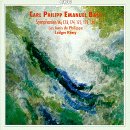Fine renditions of CPE symphonies
Molly the Cat | the USA | 02/12/2001
(4 out of 5 stars)
"Maestro Remy's recordings of five symphonies by C.P.E. Bach continue his praiseworthy efforts of bringing this composer's music to light; in addition to this disc, he has two others of Emanuel's harpsichord concertos and two more devoted to the composer's "lieder" and sacred songs.It is clear that the symphonies on this disc do not eclipse the ten symphonies on which Emanuel's symphonic reputation largely rest, the six string symphonies composed for Baron van Swieten (Wq. 182) and the "four orchestral symphonies" (Wq. 183). Most of the music here, with the exception of the e-minor symphony Wq. 178, is not as weighty as that of the Wq. 182-183 sets or as the harpsichord concerti on Remy's other discs. Also, one should not forget that these works were written while Bach was still in Berlin under the employ of Frederick the Great, whose arch-conservative musical tastes no doubt played a role in the kind of music Bach wrote at this time. Nevertheless, even in his lighter music, Emanuel continues to astonish and please with his characteristic surprises. And according to the liner notes, no less a figure than the composer Hasse called Wq. 178, the impressive e-minor work on this disc, the finest symphony he had ever heard.Ludger Remy and his ensemble Les Amis de Philippe play this music--which Remy himself transcribed from original source materials in the Berlin State Library, since few if any of these symphonies are available in modern editions--with great gusto and verve. One should also note that these symphonies exist in alternative versions of strings alone and strings with wind instruments (i.e., horns, and sometimes oboes, flutes, and bassoons). Remy chooses to play these works in their expanded-forces versions, and the results are impressive. Highly recommended."
Deliciously raucous
Leslie Richford | Selsingen, Lower Saxony | 08/09/2004
(5 out of 5 stars)
"It is a well-known adage that if you lived in the eighteenth century and said "Bach", you meant not Johann Sebastian but his second son Carl Philipp Emanuel (1714 - 1788), whose long career at the royal Prussian court in Berlin and then as successor to Telemann in Hamburg, but also, of course, his not inconsiderable musical productivity destined him to be one of the most famous musicians of his age. Today, his life and work stand very much in the shadow of his father, but the period instrument revival of the last 40 years has begun to restore him to favour, at least in the eyes of those who have time for music before Mozart.
Emanuel Bach wrote 19 symphonies: nine of them while he was still in Berlin, the other ten in Hamburg. The Berlin symphonies seem to have been scored for strings only, but had wind parts added later. The first set of Hamburg symphonies, Wq. 182,1-6, were written at the behest of Baron van Swieten (well-known to readers of Mozart biographies) and are for strings only. The last four symphonies, Wq. 183, are in twelve parts for an orchestra of about 40 musicians including horns, oboes, flutes and bassoons. It seems that none of these works was written to satisfy popular taste or demand, and Emanuel Bach, whose effective life as a composer spans the periods known to students of German literature as "Empfindsamkeit" (sensibility) and "Sturm und Drang" (usually infelicitously translated as "storm and stress"), took the opportunity of creating short, but brilliant pieces full of originality and individualism - so full, in fact, that even contemporaries complained that he had sacrificed comprehensibility to originality. Repeated notes, leaps, sudden breaks, rapid changes of tempo, sudden horn blasts ... the list could go on. In a conversation with the poet Matthias Claudius, Emanuel Bach once criticized the music of his half-brother Johann Christian as having "nothing behind it" and added, "Music has higher intentions; it is not intended [merely] to fill the ear, but [rather] to set the heart in motion" (my translation from the German original).
Although these symphonies are seldom heard and rarely recorded, they have found some excellent advocates. Five of the nine early "sinfonias" are to be found on a wonderful CD by "Les Amis de Philippe", directed by Ludger Rémy, on the German specialist label cpo. Some deliciously raucous horn playing and excellent acoustics make for real listening pleasure, and Ludger Rémy's liner notes are superb. The six string symphonies were recorded in 1977 or 1978 by the Academy of Ancient Music on L'Oiseau-Lyre and were recently re-released at budget price, a magnificent gift to the public with some glorious string playing and engineering that surpasses almost anything I have heard despite the analogue technology. The only drop of wormwood is the fact that the CD has no liner notes whatsoever.
Perhaps Emanuel Bach's greatest symphonic achievement was his Wq. 183, granted a more than excellent performance by the Orchestra of the Age of Enlightenment directed by harpsichordist Gustav Leonhardt on Virgin Veritas. The sound here is a little softer and milder than on the other two CDs, but the playing and musicianship is exquisite. I have absolutely no complaints about any of these three CDs, and if I were only able to own one of them, I would be very hard put to make a choice. Fortunately, I don't have to, instead I can enjoy all three. I doubt whether I will ever tire of listening to them."


 Track Listings (15) - Disc #1
Track Listings (15) - Disc #1